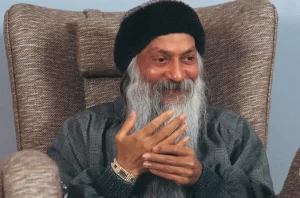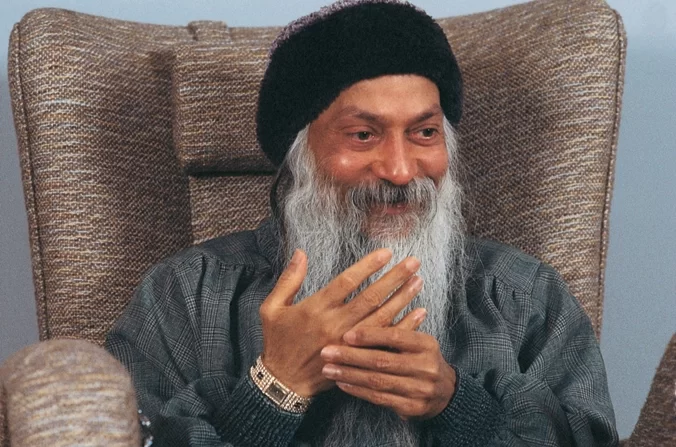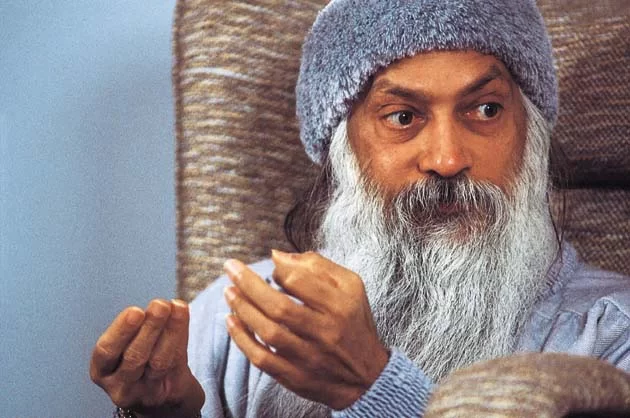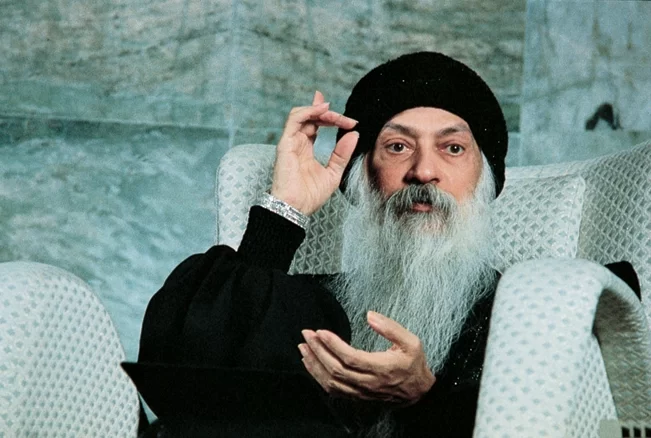BELOVED MASTER,
YOU HAVE BEEN TALKING ON YOUR VISION OF THE REBEL LATELY, AND YET THE ATMOSPHERE I FEEL AROUND US AT THE MOMENT IS PARTICULARLY SOFT, LOVING, PLIABLE. TO ME, THIS FEELS LIKE PART OF YOUR MAGIC — THAT YOU ARE SHOWING US, EXISTENTIALLY, THAT THE REBEL WILL BE BORN NOT OUT OF THE FUMES OF VIOLENCE AND UNHAPPINESS, BUT FROM THE FRAGRANCE OF LOVE AND ECSTASY.
Maneesha, the rebels who are born out of violence prove, in the end, to be anti-rebellious. The moment they are in power their rebellion disappears. They become as ugly as the predecessors they have replaced, because through violence you cannot bring flowers of love. By sowing the seeds of poison you cannot hope that the flowers will be anything other than poison. In the past, the great misery has been that those who were peaceful and loving, silent and ecstatic, were not rebels. They could not conceive that a rebellion is possible out of love, out of compassion, out of ecstasy. Their perspective was not that clear about the future possibilities. So people who were loving, people who were peaceful, people who were religious, prayerful, instead of becoming rebels simply became escapists; that was their substitute for rebellion. They escaped to the mountains, to the forests, to live a peaceful, silent and blissful life.
In a way they were certainly selfish. They never thought about those whom they were renouncing. Their compassion was not great enough and their peace was not strong enough — it was afraid of being disturbed. Their love was not great enough — it was afraid of being burned in the fumes of rebellion. And on the other hand, there were rebels but they were not peaceful and they were not silent and they had no idea of any ecstasy. They had never known anything of meditation. They had no contact with the heart. Their rebellion was only a reaction of the mind. They were angry, enraged by all the exploitation, oppression, by all the inhumanity that the establishment had been doing to other human beings. Out of their anger, out of their violence, out of their rage, they rebelled. So those who were not capable of rebellion rebelled, and those who were really capable of rebellion escaped.
Those people who were full of violence and rage succeeded. But while they were going through the rebellion they were becoming more and more accustomed to violence; and when the power came into their hands, it came into the hands of violent people. Naturally, they used that power for more violence. Now they had a great opportunity to destroy as many people as possible.
Sometimes their destruction became nonsensical. In the Soviet Union, Stalin killed at least one million people — but these one million people were not the rich people against whom he had rebelled, against whom the whole rebellion was planned. These were the poor people for whom the whole rebellion was a promise and a hope for a better future. And why were they killed? The reasons are absolutely idiotic.
Communism believes that there should be no private property. But when people are in power they become absolutely blind to human reality. For example, it is true that private property should not accumulate only in a few hands, and it should not make millions of people poor. To this extent communism is absolutely right. But to abolish private property completely is a very anti-psychological, unnatural idea. It has to be understood…
your private property gives you a certain individuality, a certain identity, a certain freedom. If all your private property is taken away and you are left absolutely naked, without any private property, you will be surprised to know that all your freedom is gone, all your individuality is gone, all your capacity to rebel is gone. In a certain way, you have been murdered. Not only has your private property been taken away, you have also been finished.
Marx had no psychological insight; he was absolutely blind about the psychological and spiritual experiences of man. His whole approach was purely economic. But man is not just money. Man is much more. Man is not just what he possesses, he is much more. But what he possesses has a certain value as far as his individuality is concerned.
According to me, the right communism should be that accumulation of private property in a few hands should be stopped, so that everybody can have private property. Nobody is super-rich and nobody is super-poor. The rich disappear, the poor disappear, the middle class becomes the only class, and people have almost equal private properties.
I am saying almost, because man should not be treated in mathematical terms. There should be some looseness. Somebody may have a little more and somebody may have a little less; it does not matter, it does not hurt. Somebody may need… a doctor may need a private car — it is part of his profession — so to take away the doctor’s private car is to take away something very essential to his profession.
So the millions of poor people who did not have much — somebody had two cows, somebody had one horse, somebody had a few hens, somebody had a small piece of land. But the blind, mathematical and economic mind of the communists — which became even more blind when the whole power was in their hands — started taking everything away from people: a small piece of land, which was not enough to provide food for the owners, but it was all that they had. It was their inheritance, their forefathers had it. Without it they suddenly found themselves utterly nude, as if their clothes had been taken away. Their houses were not much, they were not palaces; they were living in the same house where their cows and their horses were living — they were stables more than houses. But even those were taken away. Everything became the property of the state. And these poor people — for whom the revolution was made — could not understand… what kind of revolution is this? They were thinking that they would become richer, that their poverty would be gone. But on the contrary, whatever they had — even that was gone. Now they were just beggars.
Capitalism had become concentrated in the hands of the state, so the people who were in power had, for the first time, double powers — the power of politics and all the power of economics. Before, it had been divided: the economic power was in the hands of the rich people and the political power was in the hands of the politicians. There was a little division. Now the power was absolutely totalitarian. All the power became concentrated in the hands of the people who were the rulers. The poor people, who were uneducated, could not understand — what kind of equality is this? Are they making everybody poor, equally poor? Is this the equality for which the revolution was fought? And because they resisted giving their hens, their small pieces of land, their small houses, their horses or their cows… because they resisted, they were simply butchered. Out of violence only more violence is born. Those one million people were the lowest of the low. The revolution killed the poor people. It was a blind revolution, and it was bound to be — because the rebels had no idea of compassion, no love for humanity, no experience of spirituality. They were not coming from that beautiful space, they were not fighting for a better humanity. They were simply interested in destroying the establishment out of anger. In this anger there was jealousy, in this anger there was envy — all wrong things.
My effort is to bring a great synthesis between the rebel and the sannyasin. The sannyasin should not be escapist. He should grow his love, make his compassion strong enough, his ecstasy deep-rooted, centered and mature. And out of this loving space, he should rebel.
His rebellion will be basically not interested in destroying the establishment, but interested in creating a new world. His focus is to create a new world, a new man, a new humanity with new values. To create the new he has to demolish the old — but not out of anger, just out of necessity.
And he has to understand that just to impose mental ideas on people is dangerous. You have to understand people’s psychology and your rebellion has to be molded accordingly, not vice versa — not that the people have to be molded according to your idea of rebellion.
Man should never be used for any ideology. All ideologies should be used for man. Looking into man’s psychology, it is true that the vast disparity between people creates an ugly society.
Just a few days ago I was informed that in India there are only fifteen really rich people — in a country of nine hundred million people, only fifteen really rich people! So the whole wealth of nine hundred million people has been exploited; their labor, their whole life has been sucked by only fifteen families. This disparity is inhuman, because the producer is hungry and the parasite goes on collecting money which is useless to him. It is useful for those who are dying of hunger — and they are the producers. These fifteen rich families don’t work, don’t produce; they are simply clever about how to suck blood. They have spread like an octopus around millions of people, and they are sucking their blood. In a thousand and one ways all the money goes silently, without any noise, into their treasuries…This situation is ugly. The structure should certainly be changed. But it should be changed because you have a compassion, a love for all suffering human beings — not an anger, an envy, a jealousy against those few who have all the money, who have all the luxuries.
It is a question of focus: are you fighting for the poor or are you fighting because of your jealousy that you are not one of the fifteen families? Is it your jealousy, envy, anger, violence, that is prompting you to rebel against this structure? If that is the case then, when you are in power, you will be more dangerous because you will take as much revenge as you are capable of — with vengeance. But if your revolution is because you have seen the suffering of humanity, you will create a structure which will give equal opportunity to everybody to grow.
You will not impose the idea of equality, because equality simply does not exist — it is not psychological and it is not existential. A Bertrand Russell is a Bertrand Russell, and if he has a little more comfortable life, he needs it; his contribution is so great that he should be provided with all the comforts possible.
An Albert Einstein is an Albert Einstein. He is not equal to anybody else in the world and nobody can claim to be equal to him. It will be simply stupid to force him to be equal — his work is different, his genius is different. In fact, he has not to be dragged down, he is not a shopkeeper and he is not a laborer. He should not be forced to be a shopkeeper — that would be a tremendous harm to the whole evolution of mankind — and he should not be forced to be a laborer, because nobody else can replace him. Who is going to create the theory of relativity? Who is going to give us the tremendous power of atomic energy? It is unfortunate that the politicians have been using it in destroying man, but Albert Einstein is not responsible for it. The same energy could have been used for making man richer, healthier, for making the world more beautiful. Men are not equal — that is my fundamental approach.
And secondly, it is my understanding that everybody should be allowed to have private property; just the differences should not be too great, they should be within human limits.
The whole country can be rich. The state need not become the only owner of everything; that is the most dangerous thing which can happen to any country, because the state is already powerful. It has all the military, it has all the courts, it has all the police, it has all the laws, all the judges in its favor… and it wants all the finances of the country also to be in its power? Then the whole country is left absolutely nude, in the same state as beggars — “Now we don’t have anything.” And the state has become such a monster that you cannot even fight with it. The state has gathered all the powers possible into its own hands.
In Russia, all the newspapers are published by the government. You cannot write an article criticizing any policy of the government because it will not be published anywhere. But if you write it, you will be behind bars. It will never be published, but you will go out of existence! No book can be published, because only the government has the right to publish anything. And you can see the results — in the sixty years since the Russian revolution not a single Leo Tolstoy, or a Fyodor Dostoevsky, or a Turgenev, or a Chekhov, or a Gorky… these five names are pre-revolution names. These five became world-famous novelists. If you have to choose ten great novels of the world, five will be Russian. These five names have to be included, there is no other way, because they have created the best masterpieces. Where has that genius disappeared? In sixty years, not a single novel of that quality has come. It cannot come, because individuality has been completely destroyed. Now government bureaucrats decide what novels should be published and what should not be published, and these stupid bureaucrats don’t have any sensitivity. They are not poets, they are not novelists, they don’t understand the subtle nuances of creativity. But they are now the decisive factors. So the best is not published, only the third rate — because they can understand only the third rate…
Rebellion out of love, rebellion out of creativity, rebellion out of meditativeness — that’s my longing and that’s my hope. And in that hope is the hope for the whole humanity. We have to bring Gautam Buddhas to become rebellious. Only in their hands will power be unable to corrupt; on the contrary, they will be able to purify power. And only in their hands is man’s individuality safe, because they understand man’s inner and outer existence and they will be able to help humanity. They will not impose equality, but they will give equal opportunity to everybody. Whatever one wants to become, he should be given an equal opportunity to do it. Then it is his potential, his talent, his genius…
somebody will become a Bertrand Russell, somebody will become a Rabindranath Tagore, somebody will become a Picasso. And certainly, the people who will be enriching life and existence should be given a more comfortable life, because they are serving in a way nobody else can serve. Their service is unique, and their uniqueness should be respected. That does not mean that they are superior and higher, and you are smaller and lower. It simply means that we accept a fundamental fact about humanity: every man is just like himself, not like anybody else, and he will need certain private property, just as he needs his clothing…
My rebel is a meditator. He loves peace, he loves people, he loves their well-being and he will do everything for their natural growth. He will not impose any ideology, he will simply help everybody to be himself. Such a rebellion has never happened. But it is time — the right time.
If it does not happen, then you can lose all hope for any future possibility of human existence as such. The old society has become so rotten that it is going to die. Before it dies, let us create seeds for a new man. My insistence for a rebellion is to create those seeds, so when the old dies — it is bound to die, it has created its own death — the new can take its place. The new can be made alert and aware, so that it does not repeat the old pattern again. It is easier to repeat the old pattern, but once you are alert you never commit the same mistake again. It is only the stupid who go on committing the same mistakes again…
A rebellion which is religious, which is spiritual, which is not born out of the flames of violence but which is born out of the fragrance of love and compassion, out of meditation, alertness and awareness, is the only possibility for a transformation of this beautiful planet into a paradise.
Yes, what you are saying, exactly that I am trying to do. You are saying, “You have been talking on your vision of the rebel lately, and yet the atmosphere I feel around us at the moment is particularly soft, loving, pliable. To me, this feels like part of your magic — that you are showing us, existentially, that the rebel will be born not out of the fumes of violence and unhappiness, but from the fragrance of love and ecstasy.” Exactly that is what I am living for. Exactly that is what I am preparing you for.
Source:
This is an excerpt from the transcript of a public discourse by Osho in Buddha Hall, Shree Rajneesh Ashram, Pune.
Discourse Series: The Rebel
Chapter #31
Chapter title: Burning torches moving around the world
16 June 1987 am in Chuang Tzu Auditorium
References:
Osho has spoken on ‘Rebellion, power, creativity, love, meditation, compassion, alertness, awareness, transformation, freedom’ in many of His discourses. More on the subject can be referred to in the following books/discourses:
- Beyond Psychology
- The Dhammapada: The Way of the Buddha
- The Book of Wisdom
- The Beloved
- From Bondage to Freedom
- The Invitation
- The Messiah
- Sufis: The People of the Path
- Vigyan Bhairav Tantra
- Zarathustra: The Laughing Prophet
- Zen: The Path of Paradox
- The Transmission of the Lamp
- Tao: The Golden Gate











